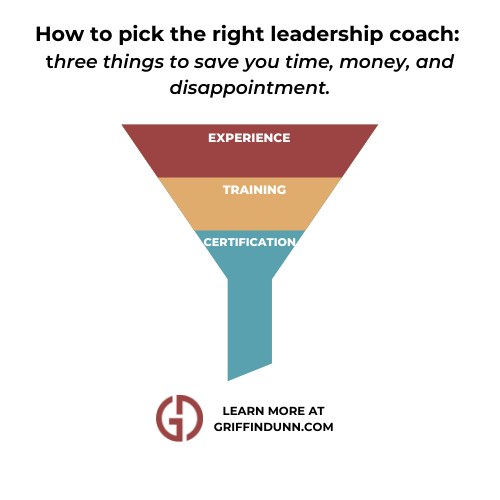How to pick the right leadership coach (act I)
Is a coach just a coach? How do I choose the right one for me?
This is the first of a three-part series of articles that will help clarify and simplify your decision, and to make sure you don’t make a bad choice.
Picking a coach is a personal decision, so the answer, unfortunately, is pretty much “it depends”. The good news is that it depends on YOU. One of the earmarks of good coaching is that, at the end of the day, it is all about you and your needs.
So what matters most to you, is what matters.
That being said, there are pluses and minuses to different levels of expertise, training, and certifications that need to be evaluated by picking a leadership coach.
First, a disclaimer: This article assumes that you are coming at this objectively and starting with a “clean slate” with regard to picking a coach. Often, that isn’t the case.
For example, many coaches (including me) are often referred to new Clients from past Clients. These referrals are from people they know, trust, and respect, and who have used a leadership coach who got them over a peak or valley in their journey in life.
Deciding to work with a coach is an important decision and the principles in this article still apply though and can be used to evaluate the recommended coach as well.
The three most important criteria for picking a leadership coach: experience, training, and certification
You should pick a Leadership Coach the same way you would choose to hire an expert (or employee) in an area that you aren’t experienced.
A great example is cybersecurity. This is a field that requires a high degree of expertise, is constantly changing, and can have a huge effect on your business. It’s also an area that you are likely not an expert in. What would you ask to eliminate “unqualified” candidates? What qualities would make the candidate “ideal” for your business or you?
There are three major criteria to evaluate and weigh according to your unique situation:
Experience, Training, and Certification.
Let’s dive deeper into the first criteria: Experience.
First Criteria: Experience.
There are four Experience Factors that are critical for you to consider.
Experience Factor 1: Experience as an executive or leadership coach
Coaching is a specialty. There are many approaches, tools, and techniques that coaches learn in training but then forge in experience.
For example, it’s one thing to have taken or administered the Myers-Briggs, or VIA or DISC evaluation of strengths a couple of times. It’s a whole different thing to have evaluated the result many times for many Clients. Each of these, and many other, tools have strengths and weaknesses that are learned over time and honed by experience.
Experience Factor 2: Experience in your industry
Not all industries are created equally. If you think that there are aspects of your industry that will weigh heavily in the coaching you need, the weight here should be high.
Some questions you should consider when assessing a coach’s industry experience:
Are there unique characteristics about your industry that deeply affect your decision-making?
Is the nomenclature of your industry unique and pervasive?
Are there multiple complex markets your industry serves? Do they require unique processes, pricing, or supply chains?
Are the markets your industry serves unique, complex, and distinct?
An example where industry experience may be very important is in Healthcare. This is a market that requires attention to patient care, quality, oversight. It also has a revenue model that isn’t replicated in other industries: in healthcare, an executive must have a thorough grasp of the revenue cycle and its implications.
Experience Factor 3: Experience at my organizational level
Depending on where you are in your career, it may be important for you to work with a leadership coach who has direct experience in a similar role, or exposure to working with other people in the role that you have.
Some questions for you to consider in evaluating a coach for organizational level experience:
How important is having a coach that is at your level of responsibility within your organization?
Would you benefit more from someone who was in a similar role in a similarly complex organization? This coach may have been moving through the world as you know it right now.
Would a coach that didn’t attain your level have a more insightful view of the situation?
Would a coach with a broader or deeper level of attained responsibility be able to give you the insight you need?
Are you working to attain this broader view in your career path? This coach can potentially help you gain the thought patterns and understanding you need to get there.
Experience Factor 4: Experience in my functional area
There may be specific functional area experience that is important for your coach to have. For example, if you are a researcher dealing with remote research partnerships, do you need someone who has done that work before? Maybe you are a marketing guru dealing with the fast-changing social media landscape, or an operations manager dealing with today’s complex supply chain. If your leadership challenges stem from the functional issues you are facing, you may want to use a coach who can provide perspective from that point of view.
Some questions for you to consider in evaluating a coach for functional expertise:
How important is it that your coach has direct experience in your functional area?
Is the situation so functionally nuanced that only a coach with direct experience would grasp the important but finer points of the situation?
As you apply these four experience filters your leadership coach candidate pool will shink to reveal the ones that are the best Experience fit for you.
Download the Experience Criteria Checklist
There are two more sets of criteria to evaluate your future leadership coach: Training and Certification. We’ll explore these areas in our next articles.
Dan Bartholomew, ICF-PCC, WPCC, is an Executive and Leadership Coach who helps teams and leaders navigate their careers 🛶. With decades of experience running, building, and scaling businesses, Dan is centered on enabling individuals and teams to achieve and sustain breakthrough performance -- personally and organizationally.
As Eric Schmidt, former CEO and current strategic advisor to Google said “everyone needs a coach.” Let’s work together to get you one!





